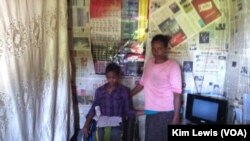One billion people in the world have disabilities and eighty 80 percent of them live in developing countries.
Light For The World - a confederation of international and local development organizations provide many of these disabled with community-based rehabilitation services that are sustainable and inclusive.
In Woliso, Ethiopia, one of the towns where Light For The World and its partners empower families to achieve life-changing goals, The Vision Community Based Rehabilitation Association says in the past year it has helped 421children with disabilities to receive home rehabilitation. The numbers are impressive, but even more so are the children behind those numbers.
Twelve-year-old Misikir Yoseph is living proof that education and physical therapy can transform a life. She is now an active part of her community and is no longer viewed as a burden to her family, a scene that three years ago did not seem possible.
Misikir was born with celebral palsy, a disorder caused by a brain defect that occurs before birth. It causes impaired mobility, involuntary movements and learning disabilities. Misikir’s parents did not know why their child was different from others. They fought a lot over it, and Misikir’s father eventually left the family.
Changing family attitudes
Misikir’s life improved when Abaynesh Zewolde worked with Misikir’s mother and others in the community to change their negative attitudes towards Miskir’s cerebral palsy. Abaynesh is a field service worker who came into Misikir’s life through a partnership with Light For The World and Woliso’s Community-Based Rehabilitation. Through an interpreter she described Misikir’s condition when they first met.
“When we found her, she was not like this,” Abaynesh said. “We found her in a lying position in a difficult situation.”
Abaynesh began the rehabilitation program with community education programs to teach the parent on the rehabilitation process. “… even to teach neighbors about the general condition of this child with a disability. In the beginning, it was a really bad situation. So, to change that sanitation and hygiene issue, we started discussing with the mother and with the neighbor.”
Light For The World and it’s local partners in Woliso strongly emphasize the importance of educating the entire community where the child with disabilities lives. In doing this, misconceptions about disabilities disappear and are replaced with support and compassion.
“The mother was completely hopeless because she even thinks that this kind of disability is not common with others. She was thinking that her child is the only one experiencing this challenge. And she was totally out-casted and stigmatized by neighbors. Even her mother segregated herself. Because of the coffee ceremony, things have changed and now the situation is good,” said Zewolde.
Teaching a community over coffee
Coffee ceremonies are a major social event in Ethiopian social and cultural life.They are also a platform for practical solutions to real-life challenges for mothers of children with disabilities. The social event becomes a formal meeting, usually held at the home of a parent of a disabled child. Information is exchanged and experiences are shared. It is a time to show support and understanding. A time to educate the community about disabilities.
“Her disability is a physical disability,” Abaynech said. “When I found her, she couldn’t use her hands. It was like in this position—her head is turned in the right position. She doesn’t use her upper extremities and her lower extremities, and it was a severe physical disability,” the health worker said.
Misikir now attends school in a wheelchair and she also helps her mother sell goods in town. With continued community-based rehabilitation, she can improve physically and mentally.
Light For the World supports community-based rehabilitation projects worldwide. In 2013, they report more than 59-thousand children with disabilities had access to their programs.




